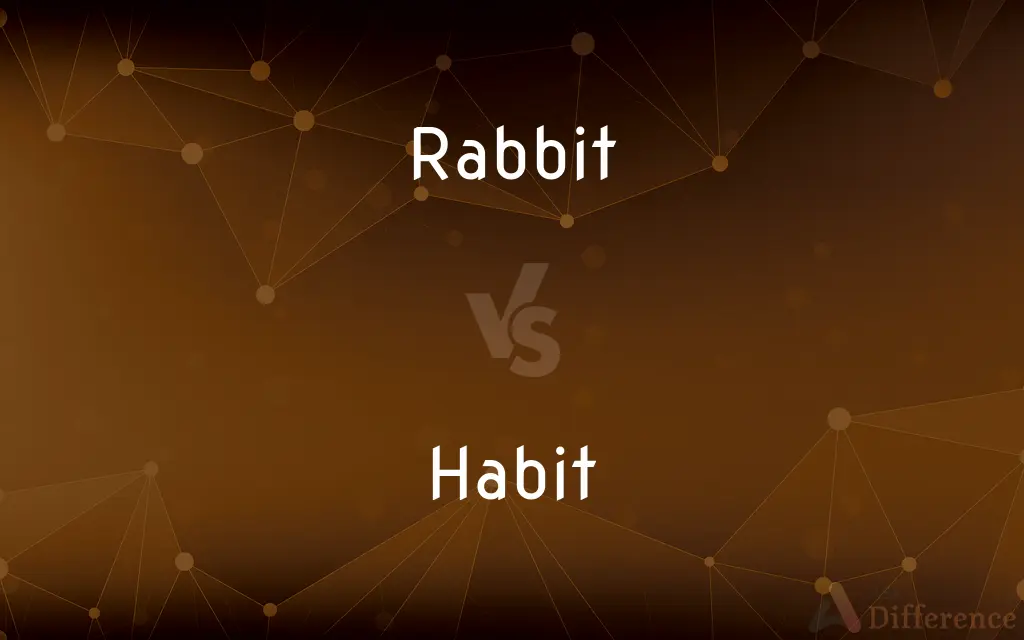Rabbit vs. Habit — What's the Difference?

Difference Between Rabbit and Habit
ADVERTISEMENT
Compare with Definitions
Rabbit
Any of various long-eared, short-tailed, burrowing mammals of the family Leporidae, such as the commonly domesticated species Oryctolagus cuniculus, native to Europe and widely introduced elsewhere, or the cottontail of the Americas.
Habit
A habit (or wont as a humorous and formal term) is a routine of behavior that is repeated regularly and tends to occur subconsciously.The American Journal of Psychology (1903) defined a "habit, from the standpoint of psychology, [as] a more or less fixed way of thinking, willing, or feeling acquired through previous repetition of a mental experience." Habitual behavior often goes unnoticed in persons exhibiting it, because a person does not need to engage in self-analysis when undertaking routine tasks. Habits are sometimes compulsory.
Rabbit
A hare.
Habit
A settled or regular tendency or practice, especially one that is hard to give up
He has an annoying habit of interrupting me
We stayed together out of habit
Good eating habits
Rabbit
The flesh of a rabbit, used as food.
ADVERTISEMENT
Habit
A long, loose garment worn by a member of a religious order
Nuns in long brown habits, black veils, and sandals
Rabbit
The fur of a rabbit or hare.
Habit
A person's health or constitution
A victim to a consumptive habit
Rabbit
A competitor who is designated to set a fast pace for a teammate during a long-distance race.
Habit
Be dressed or clothed
A boy habited as a serving lad
Rabbit
A racehorse that is run at a fast pace early in a race in order to tire the favorite so that another horse can take the lead.
Habit
A recurrent, often unconscious pattern of behavior that is acquired through frequent repetition
Made a habit of going to bed early.
Rabbit
A mechanical decoy that is propelled around the track in a greyhound race to incite the dogs.
Habit
An established disposition of the mind or character
A pessimistic habit.
Rabbit
To hunt rabbits or hares.
Habit
Customary manner or practice
An early riser by habit.
Rabbit
A mammal of the family Leporidae, with long ears, long hind legs and a short, fluffy tail.
The pioneers survived by eating the small game they could get: rabbits, squirrels and occasionally a raccoon.
Habit
An addiction, especially to a narcotic drug.
Rabbit
(uncountable) The meat from this animal.
Habit
Characteristic appearance, form, or manner of growth, especially of a plant or crystal
"The habit of an apple tree is fine for the small garden" (Robert Dash).
Rabbit
(uncountable) The fur of a rabbit typically used to imitate another animal's fur.
Habit
A distinctive set of clothing or style of dressing, especially of a religious order.
Rabbit
A runner in a distance race whose goal is mainly to set the pace, either to tire a specific rival so that a teammate can win or to help another break a record; a pacesetter.
Habit
A riding habit.
Rabbit
(cricket) A very poor batsman; selected as a bowler or wicket-keeper.
Habit
(Archaic) Physical constitution.
Rabbit
(comptheory) A large element at the beginning of a list of items to be bubble sorted, and thus tending to be quickly swapped into its correct position. Compare turtle.
Habit
To clothe; dress.
Rabbit
Rarebit; Welsh rabbit or a similar dish: melted cheese served atop toast.
Habit
To clothe in a habit, especially a nun's habit.
Rabbit
A pneumatically-controlled tool used to insert small samples of material inside the core of a nuclear reactor.
Habit
An action performed on a regular basis.
It’s become a habit of mine to have a cup of coffee after dinner.
Rabbit
(intransitive) To hunt rabbits.
Habit
An action performed repeatedly and automatically, usually without awareness.
By force of habit, he dressed for work even though it was holiday.
Rabbit
To flee.
The informant seemed skittish, as if he was about to rabbit.
When the three friends heard someone behind them yell, "police, freeze!" they each rabbited in a different direction.
Habit
A long piece of clothing worn by monks and nuns.
It’s interesting how Catholic and Buddhist monks both wear habits.
Rabbit
To talk incessantly and in a childish manner; to babble annoyingly.
Rabbit on
Stop your infernal rabbiting! Use proper words or nobody will listen to you!
Habit
A piece of clothing worn for a specific activity; a uniform.
The new riding habits of the team looked smashing!
Rabbit
Confound; damn; drat.
Habit
(archaic) Outward appearance; attire; dress.
Rabbit
Any of the smaller species of the genus Lepus, especially the common European species (Lepus cuniculus), which is often kept as a pet, and has been introduced into many countries. It is remarkably prolific, and has become a pest in some parts of Australia and New Zealand.
Habit
Form of growth or general appearance and structure of a variety or species of plant or crystal.
Rabbit
Any of various burrowing animals of the family Leporidae having long ears and short tails; some domesticated and raised for pets or food
Habit
An addiction.
He has a 10-cigar habit.
Kick the habit
Rabbit
The fur of a rabbit
Habit
(transitive) To clothe.
Rabbit
Flesh of any of various rabbits or hares (wild or domesticated) eaten as food
Habit
To inhabit.
Rabbit
Hunt rabbits
Habit
The usual condition or state of a person or thing, either natural or acquired, regarded as something had, possessed, and firmly retained; as, a religious habit; his habit is morose; elms have a spreading habit; esp., physical temperament or constitution; as, a full habit of body.
Habit
The general appearance and manner of life of a living organism.
Habit
Fixed or established custom; ordinary course of conduct; practice; usage; hence, prominently, the involuntary tendency or aptitude to perform certain actions which is acquired by their frequent repetition; as, habit is second nature; also, peculiar ways of acting; characteristic forms of behavior.
A man of very shy, retired habits.
Habit
Outward appearance; attire; dress; hence, a garment; esp., a closely fitting garment or dress worn by ladies; as, a riding habit.
Costly thy habit as thy purse can buy.
There are, among the statues, several of Venus, in different habits.
Habit
The distinctive clothing worn commonly by nuns or monks; as, in the late 1900's many orders of nuns discarded their habits and began to dress as ordinary lay women.
How use doth breed a habit in a man!
He who reigns . . . upheld by old repute,Consent, or custom
Habit
To inhabit.
In thilke places as they [birds] habiten.
Habit
To dress; to clothe; to array.
They habited themselves like those rural deities.
Habit
To accustom; to habituate.
Habit
An established custom;
It was their habit to dine at 7 every evening
Habit
A pattern of behavior acquired through frequent repetition;
She had a habit twirling the ends of her hair
Long use had hardened him to it
Habit
(religion) a distinctive attire (as the costume of a religious order)
Habit
Excessive use of drugs
Habit
Put a habit on
Share Your Discovery

Previous Comparison
Catapult vs. Onager
Next Comparison
Alloy vs. Compound














































